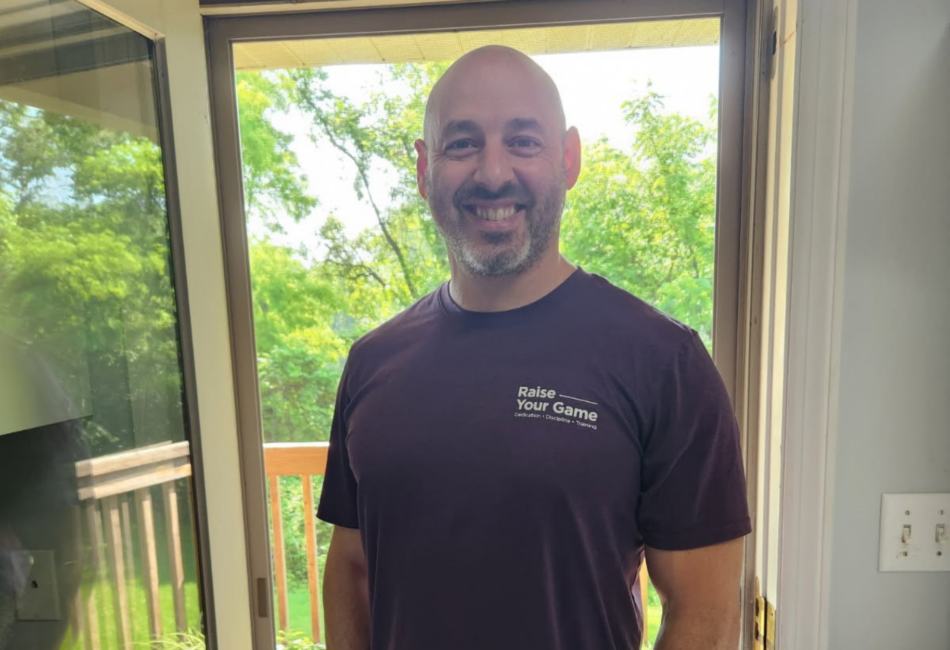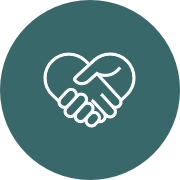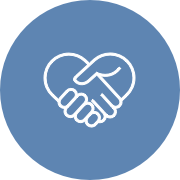From Rock Bottom to Redemption: How Adam Transforms Lives Through Peer Support

June 23, 2025
In a world where second chances are rare, and hope feels distant, sometimes it takes someone who has walked the same dark path to light the way forward. This is the story of Adam Skewers, a Peer Support Supervisor at RHD Allies, whose journey from military service to incarceration to becoming a beacon of hope illustrates the transformative power of lived experience in recovery work.
A Letter That Says Everything
Recently, a participant in the RHD Allies program sat down to write a letter that would move anyone to tears. In it, he penned these powerful words about Adam: “I would not be sitting here writing you this letter if it were not for the help Adam has given me.” The letter continued with raw honesty: “Yes, he is strict, and he is hard, and he doesn’t take any nonsense, but he cares…I would be dead without him…I know God placed him in my life.”
These aren’t just words of gratitude—they’re a testament to the life-changing impact that authentic peer support can have when delivered by someone who truly understands the struggle.
The Making of a Healer
Most people don’t find their life’s purpose through trauma, but Adam isn’t most people. After multiple military deployments, he found himself slipping through the cracks of a system that failed to diagnose his PTSD. The unrecognized trauma led to instability that he couldn’t understand or explain. Eventually, his struggles led him to prison, where he experienced firsthand the harsh reality of reentry into society with little to no support.
“I saw that there were little to no programs for assistance with individuals that are released with no real support for integrating back into society to achieve a productive life,” Adam reflects. Both experiences – his undiagnosed PTSD from military service and his struggle with reentry after incarceration – converged to create his calling. As Adam explains, these dual challenges drew him to the work and fueled his dedication.
The Power of Lived Experience
What sets Adam apart isn’t just his professional training—it’s his ability to meet participants exactly where they are because he’s been there himself. His official title may be Peer Support Supervisor, but as he puts it, “I like just to say Peer to both participants and employees, so they understand I was and still am on the same level as them.”
This authenticity creates an immediate connection that traditional therapeutic relationships often struggle to achieve. When Adam tells someone that recovery is possible, they believe him—not because of his credentials, but because he’s living proof.
Transformation in Action
One of Adam’s most meaningful success stories involves a participant who initially had “no interest in society.” Filled with rage and discontent, this individual seemed unreachable. But Adam persisted, working with him for over a year and a half. Today, that same person is employed, socializing with peers, and actively working on his well-being through self-awareness.
“Seeing him thrive and smile in his daily life in society and make efforts daily to improve his well-being through self-awareness has been one of the most challenging and rewarding situations I have dealt with thus far,” Adam shares.
Building Trust Through Consistency
Adam’s approach to building trust is deceptively simple yet profoundly effective. “I build trust with participants by being honest,” he explains. “No situation is the same, but there are similarities in recovery and struggle. If you are honest and dedicated through consistency to show that participant that you are committed to their success, it shows them through proof of doing. They can rely on you for change for the better in their lives.”
This consistency has made Adam highly effective—he maintains productivity rates over 90%, a testament to his participants’ engagement and trust in his guidance.
Evolution of Understanding
When Adam first started, Michael Van Der Zee, Program Director, notes that he frequently talked about “consequences” and how people needed to feel the “consequences” of their behavior. However, his understanding has evolved significantly. “He now understands their illness and the concept of doing things with the participant and not for the participant,” Michael observes.
This shift from consequences-based thinking to a collaborative approach represents Adam’s growth not just as a professional but as someone who has learned to extend the same compassion to others that he needed during his own healing journey.
Why Participants Respond
According to Michael, participants respond strongly to Adam because “he is compassionate and is dependable. If he says he is going to do something, he does. He finds ways to help people and has bought into our philosophy of ‘finding a way to say yes.'”
This reliability is crucial for individuals who have repeatedly been let down by systems, families, and society. When Adam makes a commitment, participants know they can count on it—a rare and precious gift for those who have learned not to trust.
Leadership Through Service
Perhaps Adam’s most significant impact extends beyond his direct work with participants. Michael notes that Adam embodies the principle that “to lead is to serve.” He takes time to help colleagues with administrative tasks, and when co-facilitating groups, he’ll let associates take credit for sessions when they need hours—putting the team’s success above his own recognition.
This servant leadership approach creates a ripple effect throughout the program, fostering an environment where everyone is committed to the participants’ success rather than their own advancement.
The Fuel for Difficult Days
What keeps Adam motivated when the work gets tough? He remembers those who didn’t give up on him. “There are individuals who did not give up on my integration and recovery into society; for that reason, I remember daily that I must do the same for those who are like myself.”
He finds his deepest reward in witnessing transformation: “Seeing an individual raise themselves up and become something that means something to themselves is a reward that bonuses and incentives can not provide.”
A Model for Peer Support Excellence
Adam’s story illustrates why peer support is so effective in recovery programs. His combination of lived experience, professional growth, and genuine care creates an environment where healing can occur. He proves that sometimes the best person to help someone climb out of a hole is someone who has successfully made that climb themselves.
In a field where burnout is common and hope can feel scarce, Adam represents the best of what peer support can be—authentic, compassionate, and transformative. His work at RHD Allies demonstrates that when we invest in people who have walked the path of recovery, they become powerful agents of change for others still finding their way.
The participant who wrote that letter was right—Adam was placed in his life for a reason. But perhaps even more importantly, that participant was placed in Adam’s life too, giving him the opportunity to pay forward the grace and support that helped him find his own way back to hope.
RHD Allies is a Forensic Certified Peer Specialist program and community mental health program whose goal is to support the recovery needs of individuals who are involved with the criminal justice system. We provide innovative and effective reentry services to people post-adjudication, meeting participants where they are and walking alongside them on their journey to recovery and independence. Through dedicated staff like Adam, we continue to prove that with the right support, transformation is always possible.


